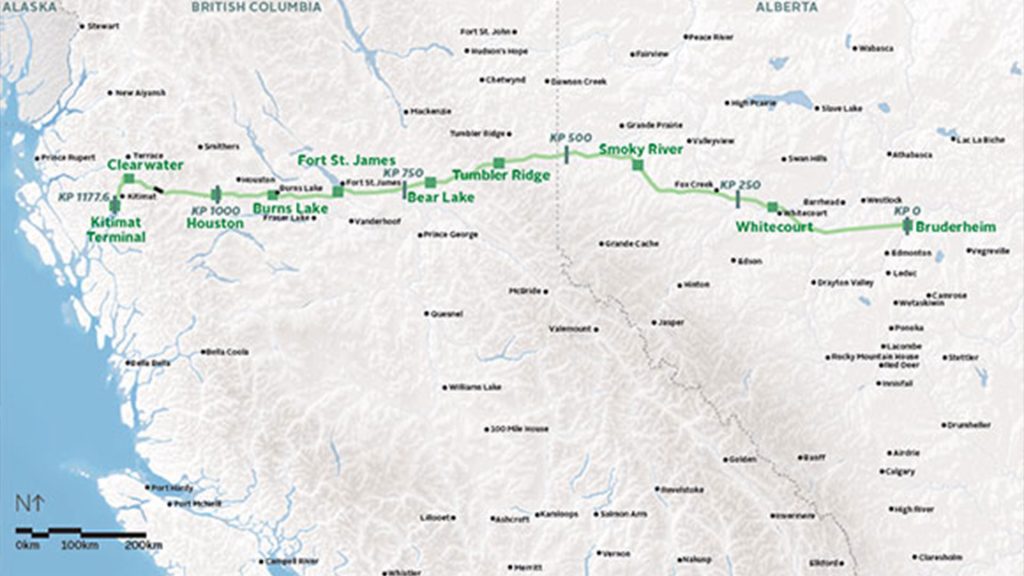
Map of the proposed Northern Gateway pipeline from the federal government's Natural Resources Canada website.
The president of the Union of BC Indian Chiefs is reversing his previous opposition to the scrapped Northern Gateway pipeline project that would have created another route for Alberta’s oil to get to the Pacific Ocean.
Grand Chief Stewart Phillip said Tuesday that while he “really fought against” Northern Gateway’s construction before it was scuttled in 2016, that was a “different time” and Canada now has “no choice” but to reconsider.
“We are staring into the abyss of uncertainty right now with climate change, the climate crisis and the American threat,” Phillip said in a news conference ahead of a meeting with B.C. First Nations leaders and the provincial cabinet in Vancouver, highlighting the U.S. administration under President Donald Trump.
“I would suggest that if we don’t build that kind of infrastructure, Trump will — and there will not be any consideration for the environment or the rule of law or anything along those lines.
“I think that we can do better. I think we need to do better.”
Phillip’s comments came after Alberta Premier Danielle Smith suggested on social media that construction of the pipeline needs to “immediately start” to diversify the country’s export markets, in light of Trump’s threatened tariffs on Canadian exports.
Speaking with reporters virtually from Washington, D.C., Smith said the goal is to “stop being so reliant on a single trading partner.”
“We’ve got to take down internal trade barriers between Canadian provinces, start looking at how we can do major nation building projects to our East and West Coast, whether it’s Northern Gateway getting restarted in British Columbia or Energy East conversations getting started off the East Coast,” she said.
Since the days where Phillip and others opposed the Northern Gateway project, a number of agreements that he described as “amazing” between First Nations, governments and corporations on resource development have yielded “clearly evident” benefits for Indigenous communities.
Prof. David Tindall, who’s in the department of sociology at the University of British Columbia, said he found Phillip’s comments “very surprising,” given he was a “central player” in the resistance against another major B.C. pipeline project, the Trans Mountain expansion between Alberta and the B.C. coast that was completed last year.
Tindall, who’s research has focused on environmental movements, said the shift may signal the knock-on effects of Trump’s presidency on Canada’s oil and gas energy projects, especially if the federal Conservatives also emerge victorious in the next election expected this year.
While a number of factors could push projects such as the Northern Gateway toward revival, there are opposing factors that would cast equal doubt on when such a pipeline would be completed.
“I do think that there will be substantial resistance from some other provinces, to some extent at the political level, and to some extent in terms of civil society,” Tindall said.
“I think in British Columbia there would be a lot of resistance. So, I think there would be, certainly, pretty wide-scale resistance amongst civil society groups, environmental groups and other groups … (and) I suspect the current provincial government would not be supportive of that type of initiative.”
Tindall also said there must also be a viable economic case for a corporation to take on the pipeline project, which must navigate what would likely be a series of court challenges from groups such as First Nations communities on the details of the project.
He noted that the federal Liberal government had to buy the Trans Mountain pipeline to make sure the project was completed.
Phillip was attending a gathering between B.C.’s cabinet and the province’s First Nations leaders in Vancouver on Tuesday, where co-ordinated approaches to Trump’s tariff threats are expected to be a key topic of discussion.
First Nations leaders said they need to be at the table for any “Team Canada” approach to engaging with the Trump administration.
But the leaders, including Phillip, political executive of the First Nations Summit Chief Cheryl Casimer, and Regional Chief of the B.C. Assembly of First Nations Terry Teegee said no one has approached Indigenous communities about collaborating yet.
Story by Chuck Chiang – with files from Lisa Johnson in Edmonton










